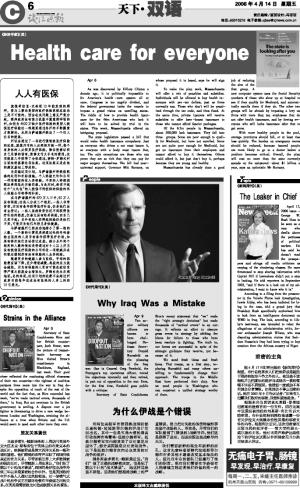April 17, 2006 issue - George W. Bush likes to be seen as a man who dwells above the pettiness of political warfare. He has said he doesn't read the newspapers and shrugs off media criticism as carping of the chattering classes. He once threatened to stop sharing information with Capitol Hill if lawmakers didn't put a stop to leaking. He told reporters in September 2003, "and if there is a leak out of my administration, I want to know who it is."
According to a filing from the prosecutor in the Valerie Plame leak investigation, Lewis Libby, who has been indicted for lying in the case, told a grand jury that President Bush specifically authorized him to leak from an intelligence document on WMD in Iraq. The leak, according to Libby's testimony, was intended to rebut the allegations of an administration critic, former ambassador Joseph Wilson, who was disputing administration claims that Saddam Hussein's Iraq had been trying to buy uranium from the African country of Niger.
泄密的主角
据4月17日即将出版的《新闻周刊》报道,布什总统喜欢人们把他看成是超脱于琐碎的政治斗争之外的人。他说他不读报纸并且把媒体的批评当成饶舌一族的喋喋不休而不屑理睬。他曾经一度威胁不再和国会分享情报,如果国会不停止泄密的话。他在2003年9月告诉记者:“如果有人泄露我们政府的秘密,我想知道他是谁。”
根据来自负责调查瓦莱丽·普莱姆泄密案的检察官的一份文件,因在此案中说谎而被指控的刘易斯·利比告诉大陪审团,布什总统特别授权他透露一份有关伊拉克大规模杀伤性武器的秘密文件的内容。根据利比证词,这次泄密意在反驳当局的批评者——前大使约瑟夫·威尔逊的主张。他对当局声称萨达姆统治下的伊拉克试图从非洲国家尼日尔购买铀表示异议。

